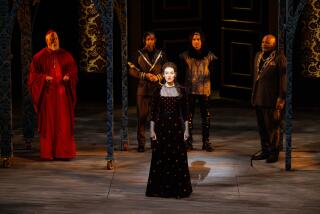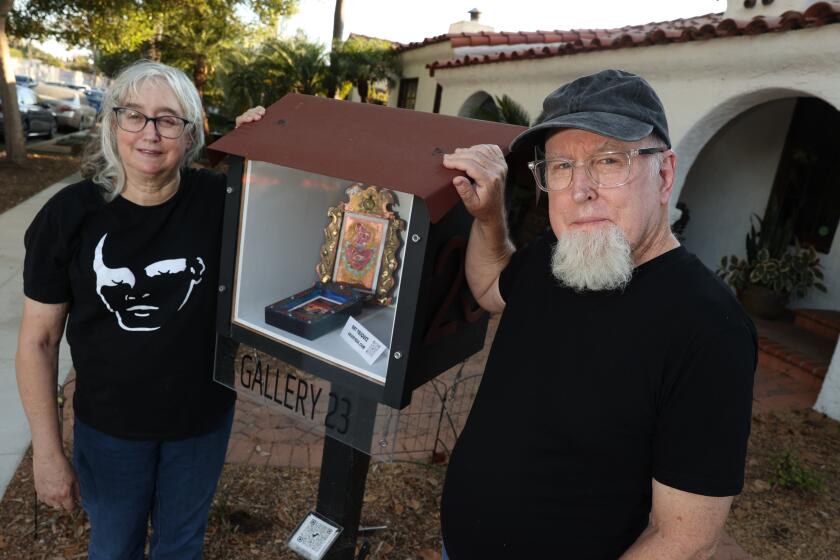‘Bad Penny,’ ‘Suddenly Last Summer,’ ‘Desert Sunrise’ and ‘Just Like White People’
“A bad penny always turns up” is a platitude that packs an unexpected existential punch, at least in the sardonic world of New York playwright Mac Wellman. In Wellman’s Obie Award-winning short play, the titular “Bad Penny” opens a portal to the metaphysical abyss that yawns beneath the banality of a summer’s day in Central Park -- and, by extension, beneath a society shaped by clichéd thought.
Staged with an austere pitch to the intellect by Frederíque Michel at Santa Monica’s City Garage, the play’s obsession with poetically fractured logic is sounded in the opening meditations of a recovering mental patient named Kat (Cynthia Mance), who wonders whether even the sky above is simply “a fake image of the true image of the sky.”
Having just found a penny by a nearby fountain, Kat is plagued with superstitious misgivings about bad luck coming to those who touch it: They could suffer the pharaoh’s curse, be eaten by trolls or be taken by the Boatman of Bow Bridge -- a latter-day Charon ferrying lost souls across the Central Park pond, in one of Wellman’s sly juxtapositions of classical mythology.
Ducking fate, Kat gives the cursed penny to Ray (Troy Dunn), a toxic waste dump worker from Montana in search of a fix for the flat tire he’s hauling, Sisyphus-like, through the park. Skeptic to the end, Ray ignores Kat’s warning, oblivious to the ominous Boatman gliding up behind them.
Juggling illusions of normality, acquiescence to authority, paranoid conspiracy theories and toxic cheese, Wellman’s witty, abstract use of language is consistently challenging. The presence of other characters does little to bridge the sense of isolation that permeates this monologue-heavy piece. The ensemble delivery is clear and capable, though some of the outlandishly petty bickering cries out for the humorous inflections of New York accents. When the entire ensemble comes together to sing a few verses of “You’re Out of the Woods” from “The Wizard of Oz,” the effect is pure irony -- no one gets off the hook here.
Though originally written for a site-specific staging at Central Park’s Bow Bridge, Charles Duncombe’s stylish production design effectively uses projected images and lighting to ease the translation to an enclosed space.
--
Philip Brandes
“Bad Penny,” City Garage, 1340 1/2 4th St. (alley), Santa Monica. 8 p.m. Fridays and Saturdays, 3 p.m. Sundays. Ends Sept. 7. $20. (310) 319-9939. Running time: 55 minutes. City Garage
Going back to ‘Last Summer’
Even Tennessee Williams’ most outré plays carry unparalleled richness of language, which makes “Suddenly Last Summer” at GTC Burbank both worthy and frustrating. Lodestone Theatre Ensemble’s spare Asian American take on Williams’ purple 1958 one-act honors the text without unloosing its demons.
There is much to admire, starting with Kim Miyori and Elaine Kao in the principal roles. Miyori, gimlet-eyed and apt of accent, plays Violet Venable, a rich matron and smother mother. For decades, Mrs. Venable and son Sebastian had vacationed together, he her virtual spouse, she his magnet for handsome youths.
Until last summer, when, after ill health dimmed Mother’s charms, Sebastian turned to nubile cousin Catherine Holly (Kao). He wound up dead, and Cathy returned a shattered soul telling a horrific story nobody believes.
Mrs. Venable dangles financial gain before Cathy’s impoverished mother (Saachiko Magwili) and brother (Feodor Chin) and young Dr. Cukrowicz (Leonard Wu) to bring her niece’s babbling to a lobotomized halt. This threat drives Williams’ plum-toned study of homosexuality, incest and the perils of predatory tourism. The metaphor-laden narrative clashes multiple symbols en route to Cathy’s climactic recollection of events at Cabeza de Lobo, an epic monologue Kao delivers with impressive control.
Barring his obscured upstage placement of Mrs. Venable during this, director Chil Kong’s staging is competent, with austerely effective designs and unforced humor. Yet the aura of subliminal depravity that this heavily encoded tale requires to unsettle -- a quality that fuels Joseph L. Mankiewicz’s much-revised 1959 film and Richard Eyre’s 1993 BBC TV adaptation -- is ephemeral.
There’s something grotesque about “Summer’s” corrosive curlicues, and that’s what gives it dramatic punch. By scanting the lurid underbelly, this respectable but prim reading inadvertently devours itself.
--
David C. Nichols
“Suddenly Last Summer,” GTC Burbank, 1111-B W. Olive Ave., Burbank. 8 p.m. Fridays and Saturdays, 2 p.m. Sundays. Ends Aug. 24. $16. (323) 993-7245. Running time: 1 hour, 20 minutes.
A parable that starts strongly
In a desert valley on the West Bank, a Palestinian shepherd awaits his beloved. An Israeli soldier, discombobulated after a bad breakup, accidentally comes upon the scene. Their lethal antagonism gradually becomes an appreciation of each other’s perspective, culminating in an impromptu slow-dancing lesson. Then the Palestinian’s girlfriend arrives, and all bets are off.
So goes “Desert Sunrise” in its capable West Coast premiere at the Lillian Theater. Misha Shulman’s nobly intended parable about the Israeli/Palestinian conflict is remarkable in its focus on the human toll to both sides.
Shulman zeros in on the cultural specifics and grievances of the occupied South Hebron region, and his elegant writing, laced throughout with Arabic and Hebrew, is tersely poetic. Director Ellen Shipley keeps the tone tautly unpredictable, making good use of silences and the impressionistic set by Adam Hunter, David Fofi and Matt Maenpaa.
The invested cast takes no prisoners. Domenic Rains gives shepherd Ismail a fuming dignity that makes his eventual softening that much more touching. Oren Dayan plays up soldier Tsahi’s devil-may-care charm without losing the combustible edge. As fundamentalist Layla, the fervent Miriam Isa suggests a frayed complexity beneath her towering rage.
Her story line is another matter. Both male characters have textual room to charge and countercharge, but Layla’s scenario, no matter how sociologically accurate, lacks the nuance to avoid polemic.
Despite the undeniable jolt of the Act 1 curtain, this narrative arc lurches “Desert Sunrise” into melodrama, which is unfortunate. Nor is the intermittent narration (spoken by Shahab Abbas) exactly helpful, formally halting the action to verbalize its subtext.
This doesn’t undo “Desert Sunrise,” and Shulman valiantly addresses a vital, incendiary topic.
--
D.C.N
“Desert Sunrise,” Lillian Theater, 1078 N. Lillian Way, Hollywood. 8 p.m., Thursdays through Saturdays, 3 p.m. Sundays. Ends Aug. 24. $35. (323) 960-7784. Running time: 1 hour, 50 minutes
Sketch comedy needs more work
In Hollywood, where factual accuracy is overrated, biopics about Genghis Khan, Chairman Mao and other famous Asians could perhaps be filmed without casting perky, golden-haired white teens -- but as an archetypally sleazy movie producer explains, when called on his historical revisionism, “Asians don’t sell -- CAUC-asians do.”
Bad puns, self-deprecation and politically incorrect stereotypes. Welcome to the ethnic satire of 18 Mighty Mountain Warriors, the San Francisco-based pan-Asian American troupe debuting its latest sketch comedy show, “Just Like White People,” at the Complex in Hollywood.
Just like typical white sketch comedy, it’s a hit-and-miss effort, though the high percentage of duds indicates the need for more development.
There are a number of promising ideas in these 16 scenes, the lion’s share of which were conceived by company co-founder Michael Chih Ming Hornbuckle, who performs with cohorts Peter J. Wong, Greg Watanabe, Jully Lee and Junko Goda.
At their sharpest, the ensemble members fearlessly assault the boundaries of taste, as in the elaborate “Asian Pacific Heritage Month” documentary, which gleefully maps regional populations to Western equivalents: the miserly Chinese are the Jews of the East; the sexually repressed Japanese are the Germans; the drinking, brawling Koreans are the Irish; the musical Filipinos are the blacks. Clearly, the Warriors are equal opportunity offenders.
Sometimes the digs are more subtle -- in a panel of naturalists that includes Jane Goodall and Dian Fossey, the lesser-known Birute Galdikas gets no respect because she studied Asian orangutans instead of African apes.
Too often, however, the performers can’t sustain the comic momentum, and the scenes run out of steam.
--
P.B.
“Just Like White People,” Complex, Ruby Theatre at The Complex, 6476 Santa Monica Blvd., Hollywood. 8 p.m. Thursdays through Sundays. Ends Aug. 24. $15. (818) 754-4500. Running time: 1 hour, 30 minutes.
More to Read
The biggest entertainment stories
Get our big stories about Hollywood, film, television, music, arts, culture and more right in your inbox as soon as they publish.
You may occasionally receive promotional content from the Los Angeles Times.










